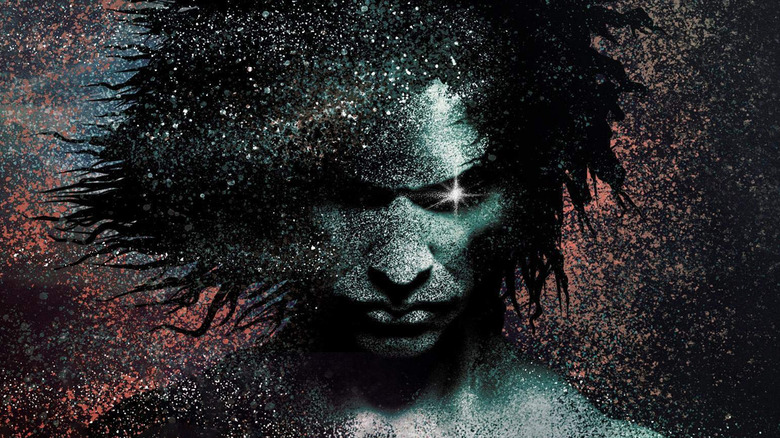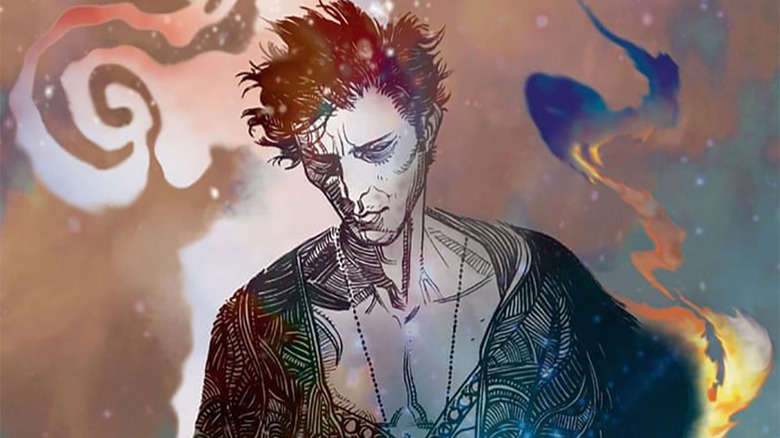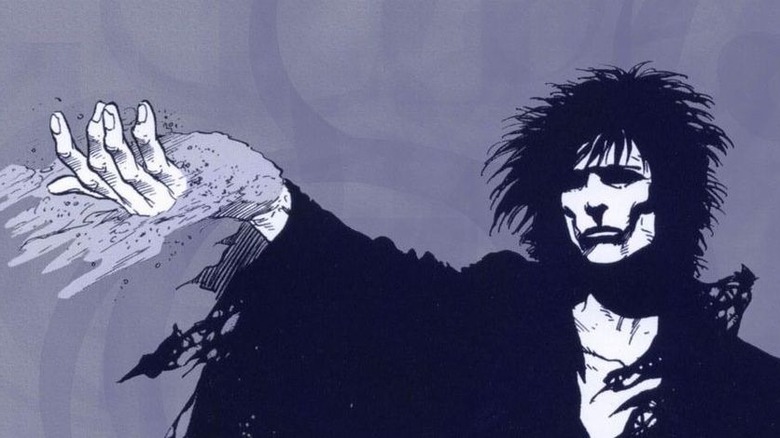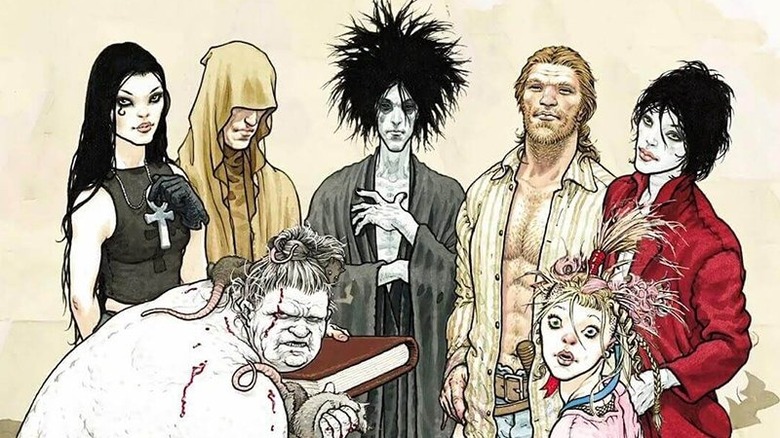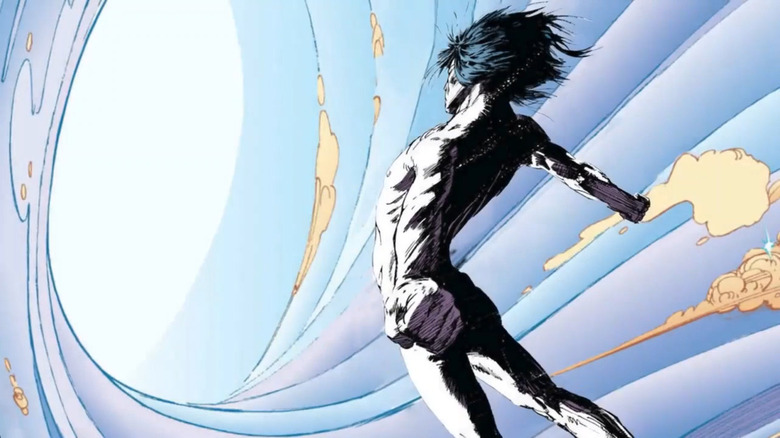The Sandman Audiobook Is Better Than It Has Any Right To Be, Even With A Disappointing Act II
How do you adapt a graphic novel series like Neil Gaiman's "The Sandman"? It's a question that has eluded Hollywood producers and filmmakers for decades — to the point of many declaring the acclaimed comic books to be unadaptable. And for many years, that was true. Until suddenly two years ago, a pair of adaptations of "The Sandman" finally sprung into being: a live-action Netflix series that was finally getting off the ground after years of gestating. And ... an audiobook?
The audiobook, when it was announced, raised more eyebrows than the live-action series, which had gone through quite a revolving door of creatives and stars since it began as a film project several decades ago. Perhaps it was because the Audible audio drama seemingly came out of nowhere — fully formed and casted and ready to go early in the pandemic in 2020. Or, most likely, it was because it seemed counterintuitive to adapt a story from a fully visual medium like comic books into a fully oral one — and one that looked as distinctive and surreal as "The Sandman," too. And yet somehow, it works.
A Superb Part I
I will be the first to admit that I didn't finish reading all of Gaiman's "Sandman" graphic novels. As a teen I had a collection of the first 6 volumes, borrowed from my comic book collector aunt, that I started reading right before bed. Big mistake. "The Sandman" gave me the most frightening and strange nightmares — particularly after I read its most famously disturbing story arc, "24 Hours." Eventually, I would absorb all the stories from "The Sandman" into my own dreams, until I wasn't sure what I had dreamed up and what Gaiman's weird little mind had dreamed up 20 or so years ago.
But I had doubts that an audio drama could recapture that bizarre waking nightmare that "The Sandman" became to me. No spoken word could match the creeping gothic art by Sam Kieth, Mike Dringenberg, Malcolm Jones III, Chris Bachalo, Michael Zulli, Steve Parkhouse, and many others. Happily, I was proven wrong by "The Sandman" Audible audio drama, dramatized and directed by Dirk Maggs, starring James McAvoy as Morpheus, and narrated by none other than Gaiman himself. Narrating via the original scripts that he had written for the comics over three decades ago, Gaiman imbued in "The Sandman" a storybook quality that was lurking beneath the horrors.
The mystical and the mythological come to the forefront in the audio drama, while the horror lay in the bloody and brutal descriptions that Gaiman unflinchingly described. (He's not a bad narrator!) And yes, "24 Hours" is as disturbing to listen to as it is to read.
Why The Sandman Audio Drama Works
"The Sandman" is, at its core, a fairy tale. When you're telling a story about an ancient being that is really an anthropomorphic representation of dreams, it kind of has to be. That's part of what makes the first part such a success — in addition to the impeccable casting (Kat Dennings as Death and Riz Ahmed as the Corinthian are particular standouts) and direction (the British have long been making radio and audio dramas and know their way around foley effects and background chatter).
But what makes "The Sandman" audio drama so successful is that, like the comics, it leaves room for the imagination. The gravel-voiced Morpheus with stars in his eyes can morph into something wilder and stranger than a Gothic Gaiman lookalike. The androgynous Desire can be the person of your wildest dreams. The 24-Hour Diner can be transform into something even more putrid and debaucherous, if that suits your fancy. And with only the first three collected volumes adapted in "The Sandman," the possibilities are endless.
Taking The Sandman Out of The Sandman Act II
I breezed through the first 20 episodes of "The Sandman," but dragged my feet a little more when came to "The Sandman Act II" (out now on Audible). That may be because of the volumes "Act II" adapts, Morpheus barely appears in a few of them. Instead, much of Act II falls on an ensemble that was unfortunately not as up to par as the first part's cast.
Remember what I said earlier about the British being well-versed with their audio dramas? That continues to be the case with Act II, with the standout performers being audio-play veterans like David Tennant as Loki (as perfect casting as you could get, really), Emma Corrin as Thessaly, and Brian Cox as Augustus. But, apart from honorary Brit John Lithgow as Joshua Norton and Jeffrey Wright as the omniscient Destiny, the American cast struggled to hold up their end of the deal, particularly in the primarily New York-set "A Game of You." (If I ever hear another bad "Long Island accent" I might scream.) And a few of the pieces of celebrity stunt casting ended up being distracting, like Kristen Schaal's totally fine performance as Delirum.
However, one performance I ended up warming to even more than in the first part was McAvoy as Morpheus. I've admitted to being cool towards McAvoy as the King of Dreams — I had felt like his performance was too heroic and light to be that gravel-voiced character I had seen on the pages of "The Sandman." But something happens in Act II that I hadn't noticed during those sleepless nights flipping through the old pages of the graphic novels. Morpheus is a little warmer, a little more flawed, even a little impish. No longer the wounded captive of the first part, Morpheus has changed into something a little more human. And McAvoy plays that very well, toeing the line between ancient figure and mischievous little stinker well.
So, What Next?
Slightly less impressed though I was with "Act II," I am looking forward to more of "The Sandman" audio drama, perhaps even more so than the Netflix live-action series. The two can easily exist alongside each other, of course, but I find something a little more freeing in the imaginative capacity of the audio drama. Perhaps while listening to it before falling asleep, Gaiman's "The Sandman" will once again find a way to creep its way into my dreams.
